Mental Health and Aging: Implications for Social Work & Human Services
VerifiedAdded on 2023/06/18
|8
|2057
|262
Report
AI Summary
This report analyzes key issues in mental health, such as depression, anxiety disorders, and psychosis, and their implications for social work and human service practices, emphasizing the need for tailored treatments and social support. It also delves into theories of aging, including the activity theory, which promotes staying active and socially engaged, and the disengagement theory, which suggests a natural withdrawal from society. The report discusses how these theories impact social work and human services, highlighting the importance of understanding and addressing the unique needs of aging individuals to improve their well-being and productivity. Access more solved assignments and study resources on Desklib.
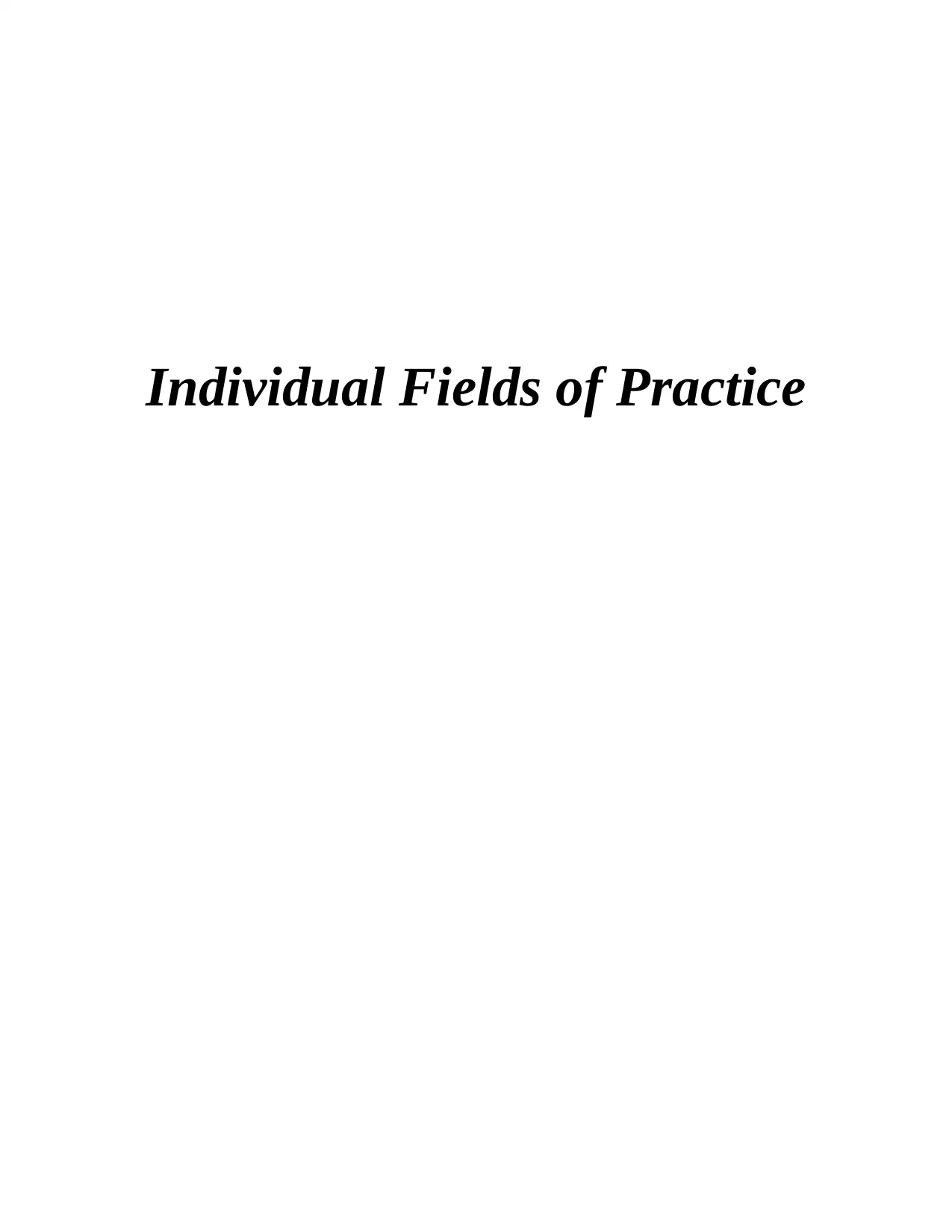
Individual Fields of Practice
Paraphrase This Document
Need a fresh take? Get an instant paraphrase of this document with our AI Paraphraser
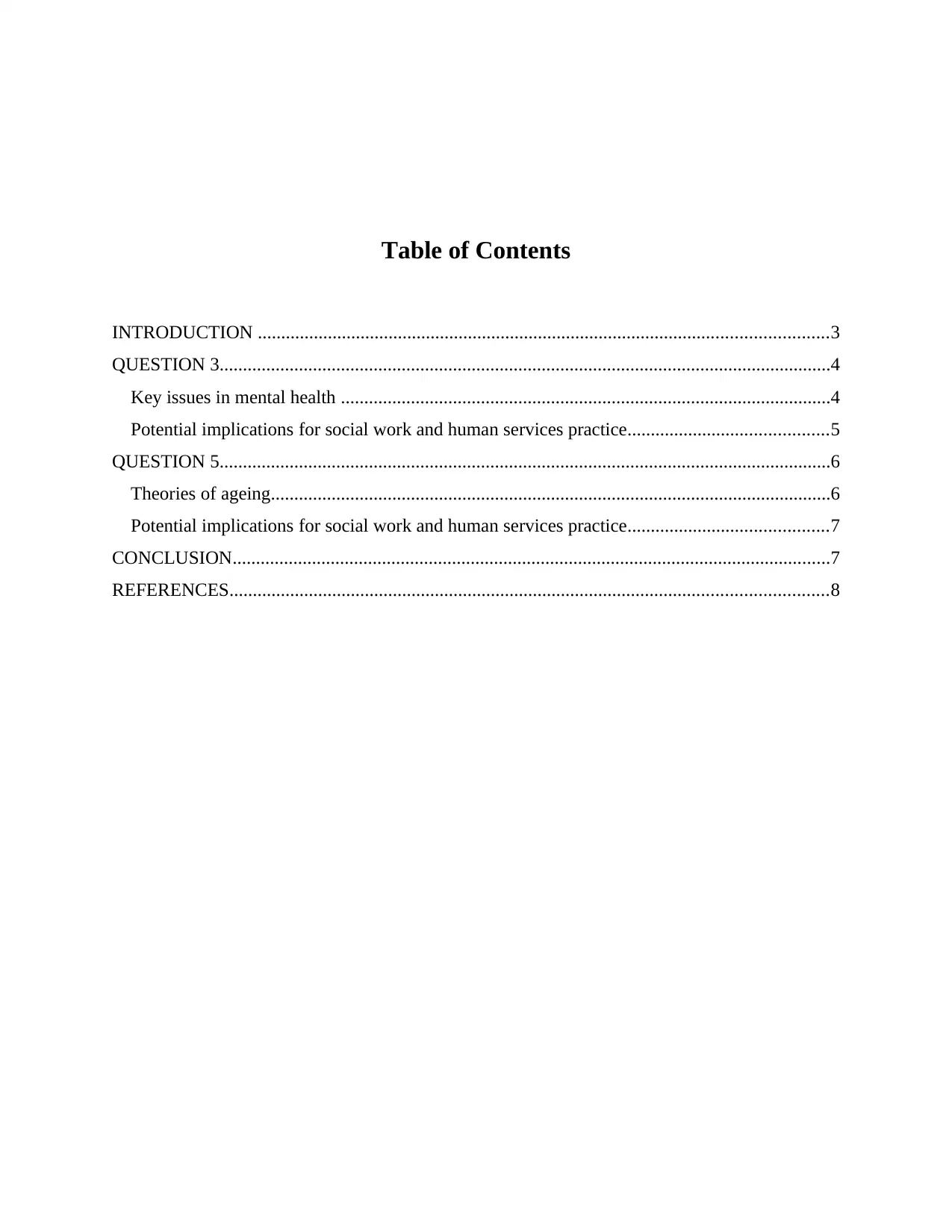
Table of Contents
INTRODUCTION ..........................................................................................................................3
QUESTION 3...................................................................................................................................4
Key issues in mental health .........................................................................................................4
Potential implications for social work and human services practice...........................................5
QUESTION 5...................................................................................................................................6
Theories of ageing........................................................................................................................6
Potential implications for social work and human services practice...........................................7
CONCLUSION................................................................................................................................7
REFERENCES................................................................................................................................8
INTRODUCTION ..........................................................................................................................3
QUESTION 3...................................................................................................................................4
Key issues in mental health .........................................................................................................4
Potential implications for social work and human services practice...........................................5
QUESTION 5...................................................................................................................................6
Theories of ageing........................................................................................................................6
Potential implications for social work and human services practice...........................................7
CONCLUSION................................................................................................................................7
REFERENCES................................................................................................................................8
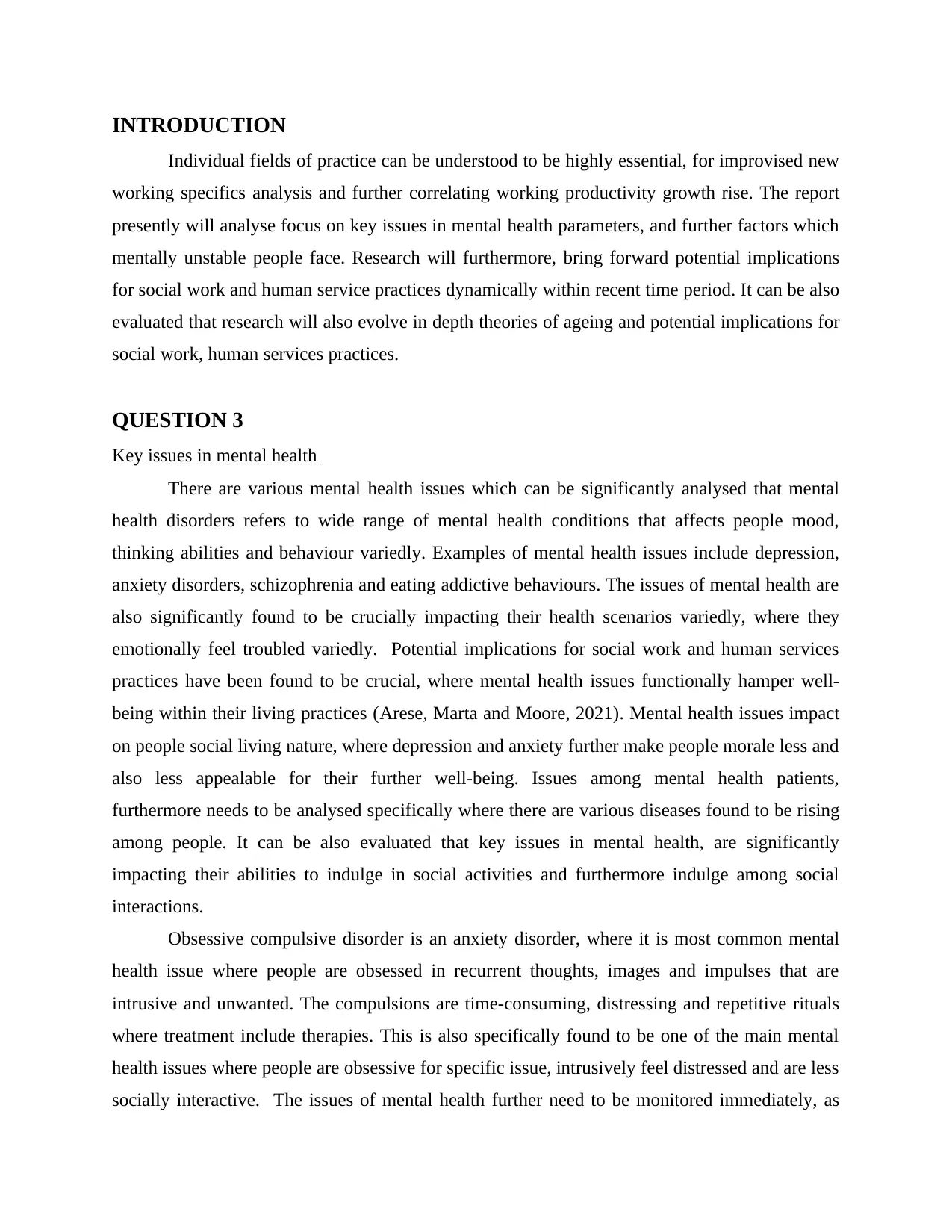
INTRODUCTION
Individual fields of practice can be understood to be highly essential, for improvised new
working specifics analysis and further correlating working productivity growth rise. The report
presently will analyse focus on key issues in mental health parameters, and further factors which
mentally unstable people face. Research will furthermore, bring forward potential implications
for social work and human service practices dynamically within recent time period. It can be also
evaluated that research will also evolve in depth theories of ageing and potential implications for
social work, human services practices.
QUESTION 3
Key issues in mental health
There are various mental health issues which can be significantly analysed that mental
health disorders refers to wide range of mental health conditions that affects people mood,
thinking abilities and behaviour variedly. Examples of mental health issues include depression,
anxiety disorders, schizophrenia and eating addictive behaviours. The issues of mental health are
also significantly found to be crucially impacting their health scenarios variedly, where they
emotionally feel troubled variedly. Potential implications for social work and human services
practices have been found to be crucial, where mental health issues functionally hamper well-
being within their living practices (Arese, Marta and Moore, 2021). Mental health issues impact
on people social living nature, where depression and anxiety further make people morale less and
also less appealable for their further well-being. Issues among mental health patients,
furthermore needs to be analysed specifically where there are various diseases found to be rising
among people. It can be also evaluated that key issues in mental health, are significantly
impacting their abilities to indulge in social activities and furthermore indulge among social
interactions.
Obsessive compulsive disorder is an anxiety disorder, where it is most common mental
health issue where people are obsessed in recurrent thoughts, images and impulses that are
intrusive and unwanted. The compulsions are time-consuming, distressing and repetitive rituals
where treatment include therapies. This is also specifically found to be one of the main mental
health issues where people are obsessive for specific issue, intrusively feel distressed and are less
socially interactive. The issues of mental health further need to be monitored immediately, as
Individual fields of practice can be understood to be highly essential, for improvised new
working specifics analysis and further correlating working productivity growth rise. The report
presently will analyse focus on key issues in mental health parameters, and further factors which
mentally unstable people face. Research will furthermore, bring forward potential implications
for social work and human service practices dynamically within recent time period. It can be also
evaluated that research will also evolve in depth theories of ageing and potential implications for
social work, human services practices.
QUESTION 3
Key issues in mental health
There are various mental health issues which can be significantly analysed that mental
health disorders refers to wide range of mental health conditions that affects people mood,
thinking abilities and behaviour variedly. Examples of mental health issues include depression,
anxiety disorders, schizophrenia and eating addictive behaviours. The issues of mental health are
also significantly found to be crucially impacting their health scenarios variedly, where they
emotionally feel troubled variedly. Potential implications for social work and human services
practices have been found to be crucial, where mental health issues functionally hamper well-
being within their living practices (Arese, Marta and Moore, 2021). Mental health issues impact
on people social living nature, where depression and anxiety further make people morale less and
also less appealable for their further well-being. Issues among mental health patients,
furthermore needs to be analysed specifically where there are various diseases found to be rising
among people. It can be also evaluated that key issues in mental health, are significantly
impacting their abilities to indulge in social activities and furthermore indulge among social
interactions.
Obsessive compulsive disorder is an anxiety disorder, where it is most common mental
health issue where people are obsessed in recurrent thoughts, images and impulses that are
intrusive and unwanted. The compulsions are time-consuming, distressing and repetitive rituals
where treatment include therapies. This is also specifically found to be one of the main mental
health issues where people are obsessive for specific issue, intrusively feel distressed and are less
socially interactive. The issues of mental health further need to be monitored immediately, as
⊘ This is a preview!⊘
Do you want full access?
Subscribe today to unlock all pages.

Trusted by 1+ million students worldwide
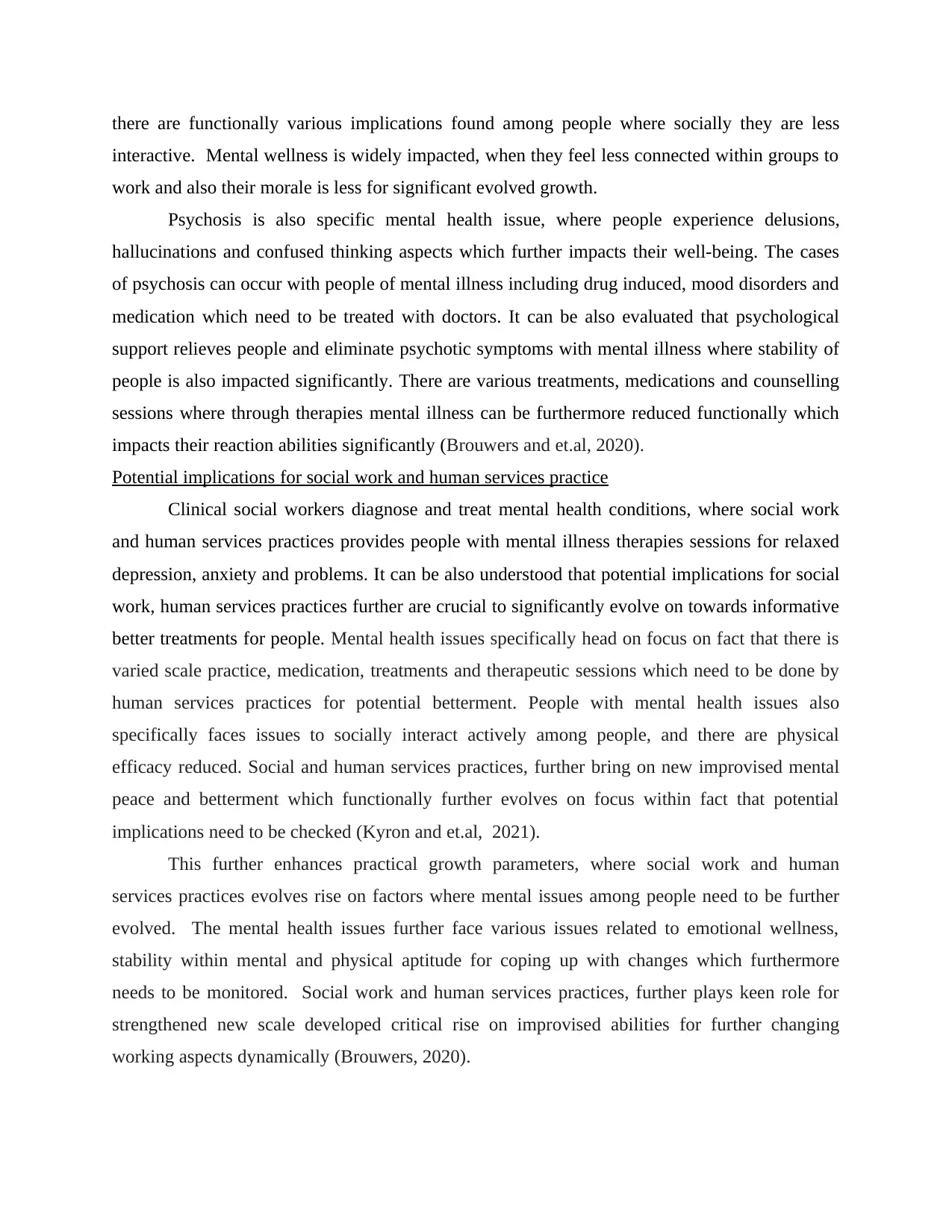
there are functionally various implications found among people where socially they are less
interactive. Mental wellness is widely impacted, when they feel less connected within groups to
work and also their morale is less for significant evolved growth.
Psychosis is also specific mental health issue, where people experience delusions,
hallucinations and confused thinking aspects which further impacts their well-being. The cases
of psychosis can occur with people of mental illness including drug induced, mood disorders and
medication which need to be treated with doctors. It can be also evaluated that psychological
support relieves people and eliminate psychotic symptoms with mental illness where stability of
people is also impacted significantly. There are various treatments, medications and counselling
sessions where through therapies mental illness can be furthermore reduced functionally which
impacts their reaction abilities significantly (Brouwers and et.al, 2020).
Potential implications for social work and human services practice
Clinical social workers diagnose and treat mental health conditions, where social work
and human services practices provides people with mental illness therapies sessions for relaxed
depression, anxiety and problems. It can be also understood that potential implications for social
work, human services practices further are crucial to significantly evolve on towards informative
better treatments for people. Mental health issues specifically head on focus on fact that there is
varied scale practice, medication, treatments and therapeutic sessions which need to be done by
human services practices for potential betterment. People with mental health issues also
specifically faces issues to socially interact actively among people, and there are physical
efficacy reduced. Social and human services practices, further bring on new improvised mental
peace and betterment which functionally further evolves on focus within fact that potential
implications need to be checked (Kyron and et.al, 2021).
This further enhances practical growth parameters, where social work and human
services practices evolves rise on factors where mental issues among people need to be further
evolved. The mental health issues further face various issues related to emotional wellness,
stability within mental and physical aptitude for coping up with changes which furthermore
needs to be monitored. Social work and human services practices, further plays keen role for
strengthened new scale developed critical rise on improvised abilities for further changing
working aspects dynamically (Brouwers, 2020).
interactive. Mental wellness is widely impacted, when they feel less connected within groups to
work and also their morale is less for significant evolved growth.
Psychosis is also specific mental health issue, where people experience delusions,
hallucinations and confused thinking aspects which further impacts their well-being. The cases
of psychosis can occur with people of mental illness including drug induced, mood disorders and
medication which need to be treated with doctors. It can be also evaluated that psychological
support relieves people and eliminate psychotic symptoms with mental illness where stability of
people is also impacted significantly. There are various treatments, medications and counselling
sessions where through therapies mental illness can be furthermore reduced functionally which
impacts their reaction abilities significantly (Brouwers and et.al, 2020).
Potential implications for social work and human services practice
Clinical social workers diagnose and treat mental health conditions, where social work
and human services practices provides people with mental illness therapies sessions for relaxed
depression, anxiety and problems. It can be also understood that potential implications for social
work, human services practices further are crucial to significantly evolve on towards informative
better treatments for people. Mental health issues specifically head on focus on fact that there is
varied scale practice, medication, treatments and therapeutic sessions which need to be done by
human services practices for potential betterment. People with mental health issues also
specifically faces issues to socially interact actively among people, and there are physical
efficacy reduced. Social and human services practices, further bring on new improvised mental
peace and betterment which functionally further evolves on focus within fact that potential
implications need to be checked (Kyron and et.al, 2021).
This further enhances practical growth parameters, where social work and human
services practices evolves rise on factors where mental issues among people need to be further
evolved. The mental health issues further face various issues related to emotional wellness,
stability within mental and physical aptitude for coping up with changes which furthermore
needs to be monitored. Social work and human services practices, further plays keen role for
strengthened new scale developed critical rise on improvised abilities for further changing
working aspects dynamically (Brouwers, 2020).
Paraphrase This Document
Need a fresh take? Get an instant paraphrase of this document with our AI Paraphraser
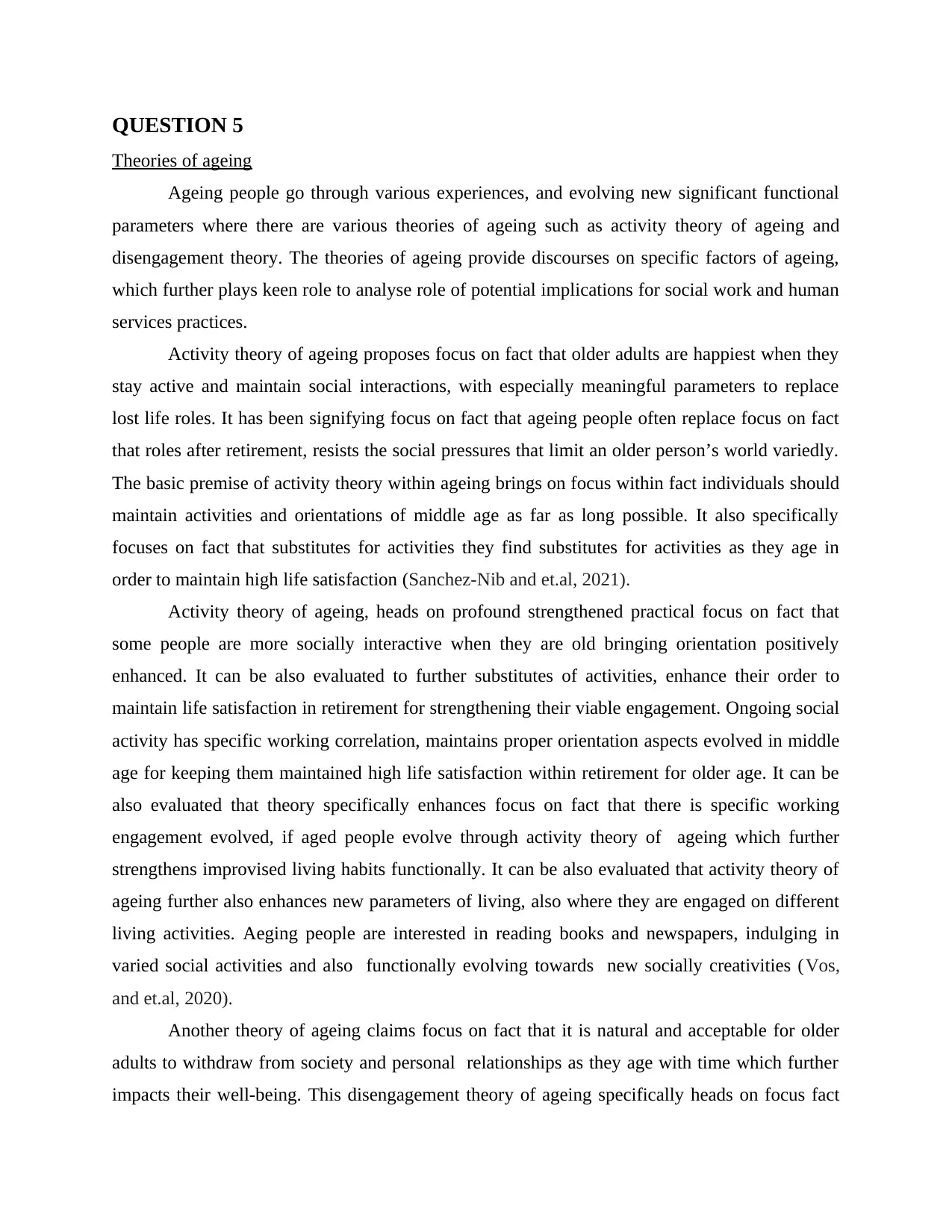
QUESTION 5
Theories of ageing
Ageing people go through various experiences, and evolving new significant functional
parameters where there are various theories of ageing such as activity theory of ageing and
disengagement theory. The theories of ageing provide discourses on specific factors of ageing,
which further plays keen role to analyse role of potential implications for social work and human
services practices.
Activity theory of ageing proposes focus on fact that older adults are happiest when they
stay active and maintain social interactions, with especially meaningful parameters to replace
lost life roles. It has been signifying focus on fact that ageing people often replace focus on fact
that roles after retirement, resists the social pressures that limit an older person’s world variedly.
The basic premise of activity theory within ageing brings on focus within fact individuals should
maintain activities and orientations of middle age as far as long possible. It also specifically
focuses on fact that substitutes for activities they find substitutes for activities as they age in
order to maintain high life satisfaction (Sanchez-Nib and et.al, 2021).
Activity theory of ageing, heads on profound strengthened practical focus on fact that
some people are more socially interactive when they are old bringing orientation positively
enhanced. It can be also evaluated to further substitutes of activities, enhance their order to
maintain life satisfaction in retirement for strengthening their viable engagement. Ongoing social
activity has specific working correlation, maintains proper orientation aspects evolved in middle
age for keeping them maintained high life satisfaction within retirement for older age. It can be
also evaluated that theory specifically enhances focus on fact that there is specific working
engagement evolved, if aged people evolve through activity theory of ageing which further
strengthens improvised living habits functionally. It can be also evaluated that activity theory of
ageing further also enhances new parameters of living, also where they are engaged on different
living activities. Aeging people are interested in reading books and newspapers, indulging in
varied social activities and also functionally evolving towards new socially creativities (Vos,
and et.al, 2020).
Another theory of ageing claims focus on fact that it is natural and acceptable for older
adults to withdraw from society and personal relationships as they age with time which further
impacts their well-being. This disengagement theory of ageing specifically heads on focus fact
Theories of ageing
Ageing people go through various experiences, and evolving new significant functional
parameters where there are various theories of ageing such as activity theory of ageing and
disengagement theory. The theories of ageing provide discourses on specific factors of ageing,
which further plays keen role to analyse role of potential implications for social work and human
services practices.
Activity theory of ageing proposes focus on fact that older adults are happiest when they
stay active and maintain social interactions, with especially meaningful parameters to replace
lost life roles. It has been signifying focus on fact that ageing people often replace focus on fact
that roles after retirement, resists the social pressures that limit an older person’s world variedly.
The basic premise of activity theory within ageing brings on focus within fact individuals should
maintain activities and orientations of middle age as far as long possible. It also specifically
focuses on fact that substitutes for activities they find substitutes for activities as they age in
order to maintain high life satisfaction (Sanchez-Nib and et.al, 2021).
Activity theory of ageing, heads on profound strengthened practical focus on fact that
some people are more socially interactive when they are old bringing orientation positively
enhanced. It can be also evaluated to further substitutes of activities, enhance their order to
maintain life satisfaction in retirement for strengthening their viable engagement. Ongoing social
activity has specific working correlation, maintains proper orientation aspects evolved in middle
age for keeping them maintained high life satisfaction within retirement for older age. It can be
also evaluated that theory specifically enhances focus on fact that there is specific working
engagement evolved, if aged people evolve through activity theory of ageing which further
strengthens improvised living habits functionally. It can be also evaluated that activity theory of
ageing further also enhances new parameters of living, also where they are engaged on different
living activities. Aeging people are interested in reading books and newspapers, indulging in
varied social activities and also functionally evolving towards new socially creativities (Vos,
and et.al, 2020).
Another theory of ageing claims focus on fact that it is natural and acceptable for older
adults to withdraw from society and personal relationships as they age with time which further
impacts their well-being. This disengagement theory of ageing specifically heads on focus fact
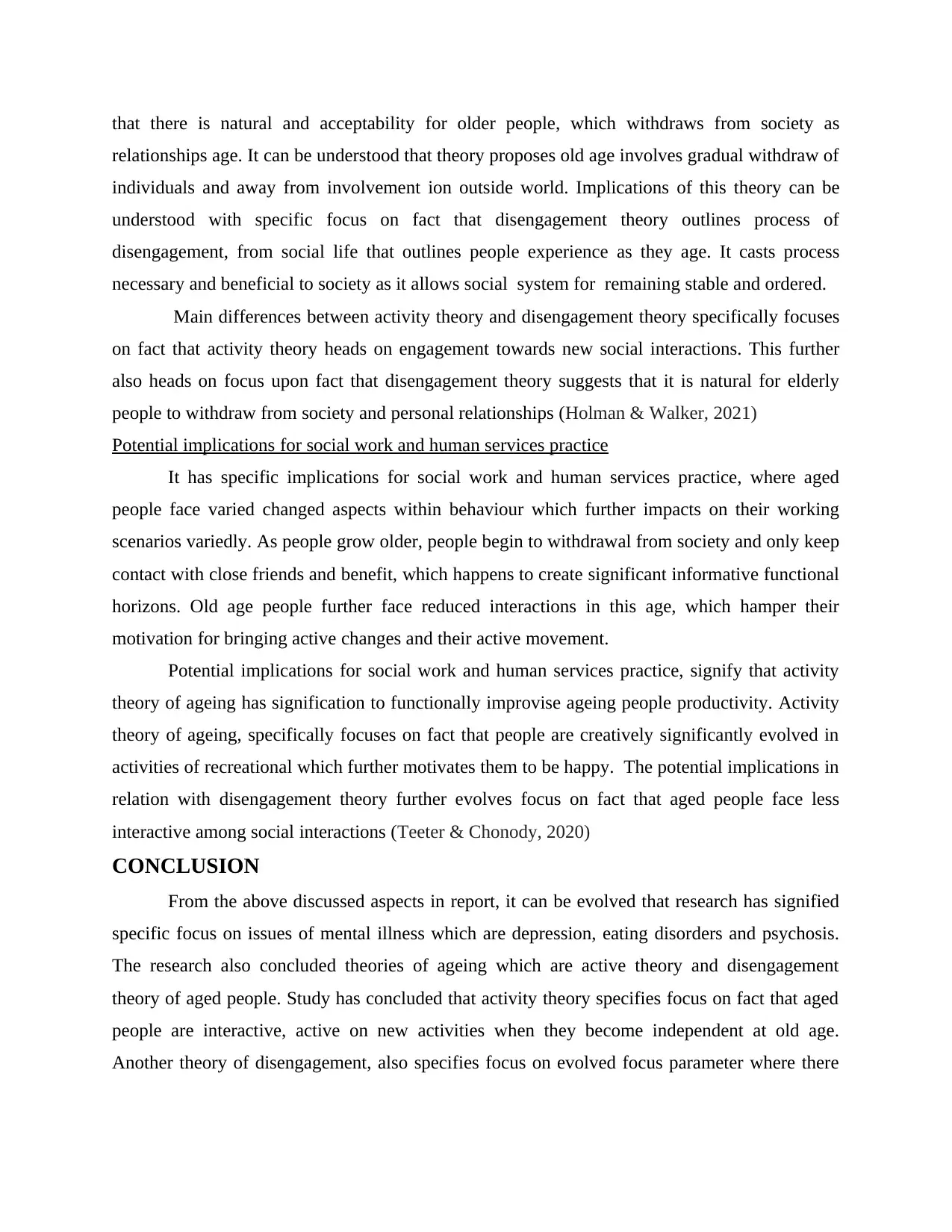
that there is natural and acceptability for older people, which withdraws from society as
relationships age. It can be understood that theory proposes old age involves gradual withdraw of
individuals and away from involvement ion outside world. Implications of this theory can be
understood with specific focus on fact that disengagement theory outlines process of
disengagement, from social life that outlines people experience as they age. It casts process
necessary and beneficial to society as it allows social system for remaining stable and ordered.
Main differences between activity theory and disengagement theory specifically focuses
on fact that activity theory heads on engagement towards new social interactions. This further
also heads on focus upon fact that disengagement theory suggests that it is natural for elderly
people to withdraw from society and personal relationships (Holman & Walker, 2021)
Potential implications for social work and human services practice
It has specific implications for social work and human services practice, where aged
people face varied changed aspects within behaviour which further impacts on their working
scenarios variedly. As people grow older, people begin to withdrawal from society and only keep
contact with close friends and benefit, which happens to create significant informative functional
horizons. Old age people further face reduced interactions in this age, which hamper their
motivation for bringing active changes and their active movement.
Potential implications for social work and human services practice, signify that activity
theory of ageing has signification to functionally improvise ageing people productivity. Activity
theory of ageing, specifically focuses on fact that people are creatively significantly evolved in
activities of recreational which further motivates them to be happy. The potential implications in
relation with disengagement theory further evolves focus on fact that aged people face less
interactive among social interactions (Teeter & Chonody, 2020)
CONCLUSION
From the above discussed aspects in report, it can be evolved that research has signified
specific focus on issues of mental illness which are depression, eating disorders and psychosis.
The research also concluded theories of ageing which are active theory and disengagement
theory of aged people. Study has concluded that activity theory specifies focus on fact that aged
people are interactive, active on new activities when they become independent at old age.
Another theory of disengagement, also specifies focus on evolved focus parameter where there
relationships age. It can be understood that theory proposes old age involves gradual withdraw of
individuals and away from involvement ion outside world. Implications of this theory can be
understood with specific focus on fact that disengagement theory outlines process of
disengagement, from social life that outlines people experience as they age. It casts process
necessary and beneficial to society as it allows social system for remaining stable and ordered.
Main differences between activity theory and disengagement theory specifically focuses
on fact that activity theory heads on engagement towards new social interactions. This further
also heads on focus upon fact that disengagement theory suggests that it is natural for elderly
people to withdraw from society and personal relationships (Holman & Walker, 2021)
Potential implications for social work and human services practice
It has specific implications for social work and human services practice, where aged
people face varied changed aspects within behaviour which further impacts on their working
scenarios variedly. As people grow older, people begin to withdrawal from society and only keep
contact with close friends and benefit, which happens to create significant informative functional
horizons. Old age people further face reduced interactions in this age, which hamper their
motivation for bringing active changes and their active movement.
Potential implications for social work and human services practice, signify that activity
theory of ageing has signification to functionally improvise ageing people productivity. Activity
theory of ageing, specifically focuses on fact that people are creatively significantly evolved in
activities of recreational which further motivates them to be happy. The potential implications in
relation with disengagement theory further evolves focus on fact that aged people face less
interactive among social interactions (Teeter & Chonody, 2020)
CONCLUSION
From the above discussed aspects in report, it can be evolved that research has signified
specific focus on issues of mental illness which are depression, eating disorders and psychosis.
The research also concluded theories of ageing which are active theory and disengagement
theory of aged people. Study has concluded that activity theory specifies focus on fact that aged
people are interactive, active on new activities when they become independent at old age.
Another theory of disengagement, also specifies focus on evolved focus parameter where there
⊘ This is a preview!⊘
Do you want full access?
Subscribe today to unlock all pages.

Trusted by 1+ million students worldwide

are reluctant inhibitions, found among aged people to be active among people and withdrawal is
found.
found.
Paraphrase This Document
Need a fresh take? Get an instant paraphrase of this document with our AI Paraphraser
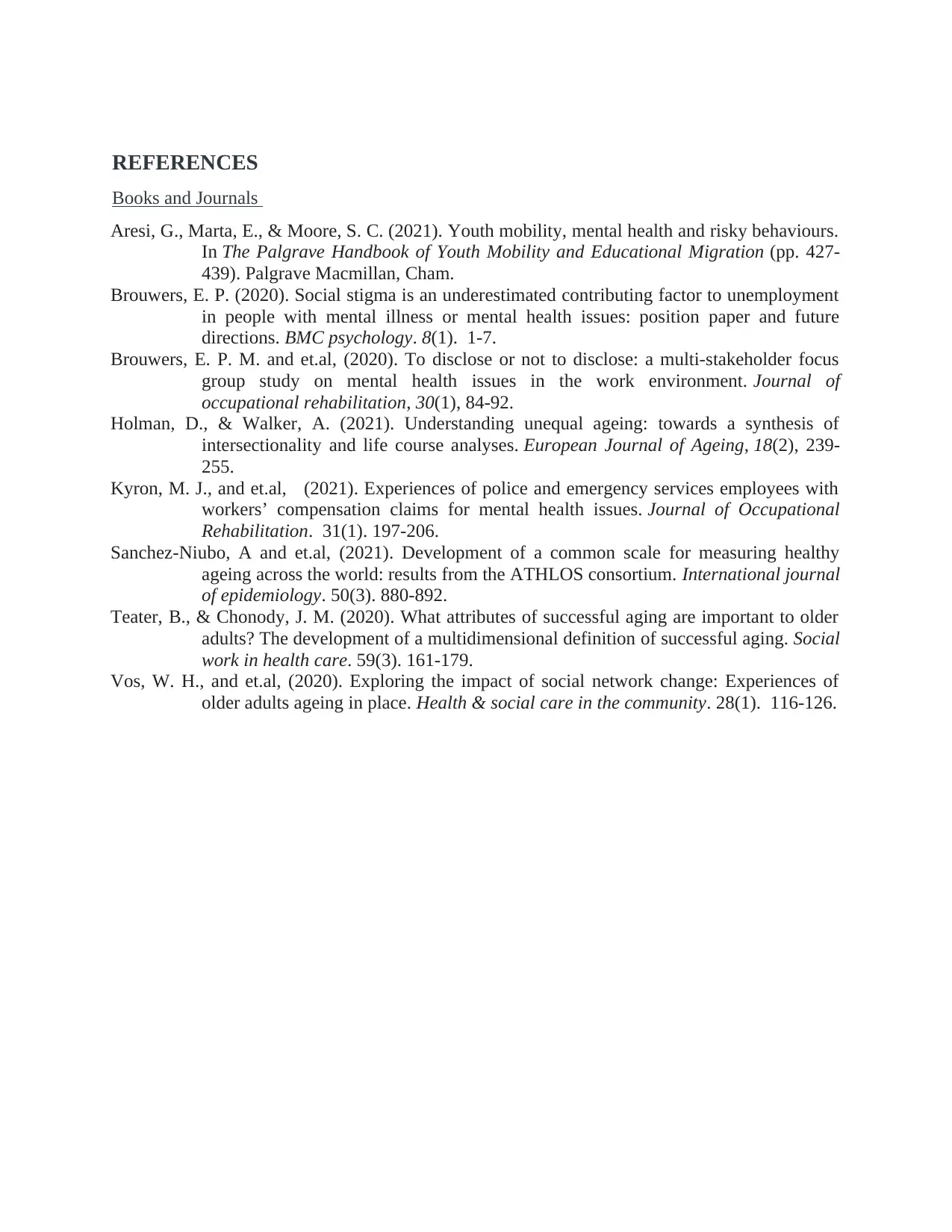
REFERENCES
Books and Journals
Aresi, G., Marta, E., & Moore, S. C. (2021). Youth mobility, mental health and risky behaviours.
In The Palgrave Handbook of Youth Mobility and Educational Migration (pp. 427-
439). Palgrave Macmillan, Cham.
Brouwers, E. P. (2020). Social stigma is an underestimated contributing factor to unemployment
in people with mental illness or mental health issues: position paper and future
directions. BMC psychology. 8(1). 1-7.
Brouwers, E. P. M. and et.al, (2020). To disclose or not to disclose: a multi-stakeholder focus
group study on mental health issues in the work environment. Journal of
occupational rehabilitation, 30(1), 84-92.
Holman, D., & Walker, A. (2021). Understanding unequal ageing: towards a synthesis of
intersectionality and life course analyses. European Journal of Ageing, 18(2), 239-
255.
Kyron, M. J., and et.al, (2021). Experiences of police and emergency services employees with
workers’ compensation claims for mental health issues. Journal of Occupational
Rehabilitation. 31(1). 197-206.
Sanchez-Niubo, A and et.al, (2021). Development of a common scale for measuring healthy
ageing across the world: results from the ATHLOS consortium. International journal
of epidemiology. 50(3). 880-892.
Teater, B., & Chonody, J. M. (2020). What attributes of successful aging are important to older
adults? The development of a multidimensional definition of successful aging. Social
work in health care. 59(3). 161-179.
Vos, W. H., and et.al, (2020). Exploring the impact of social network change: Experiences of
older adults ageing in place. Health & social care in the community. 28(1). 116-126.
Books and Journals
Aresi, G., Marta, E., & Moore, S. C. (2021). Youth mobility, mental health and risky behaviours.
In The Palgrave Handbook of Youth Mobility and Educational Migration (pp. 427-
439). Palgrave Macmillan, Cham.
Brouwers, E. P. (2020). Social stigma is an underestimated contributing factor to unemployment
in people with mental illness or mental health issues: position paper and future
directions. BMC psychology. 8(1). 1-7.
Brouwers, E. P. M. and et.al, (2020). To disclose or not to disclose: a multi-stakeholder focus
group study on mental health issues in the work environment. Journal of
occupational rehabilitation, 30(1), 84-92.
Holman, D., & Walker, A. (2021). Understanding unequal ageing: towards a synthesis of
intersectionality and life course analyses. European Journal of Ageing, 18(2), 239-
255.
Kyron, M. J., and et.al, (2021). Experiences of police and emergency services employees with
workers’ compensation claims for mental health issues. Journal of Occupational
Rehabilitation. 31(1). 197-206.
Sanchez-Niubo, A and et.al, (2021). Development of a common scale for measuring healthy
ageing across the world: results from the ATHLOS consortium. International journal
of epidemiology. 50(3). 880-892.
Teater, B., & Chonody, J. M. (2020). What attributes of successful aging are important to older
adults? The development of a multidimensional definition of successful aging. Social
work in health care. 59(3). 161-179.
Vos, W. H., and et.al, (2020). Exploring the impact of social network change: Experiences of
older adults ageing in place. Health & social care in the community. 28(1). 116-126.
1 out of 8
Related Documents
Your All-in-One AI-Powered Toolkit for Academic Success.
+13062052269
info@desklib.com
Available 24*7 on WhatsApp / Email
![[object Object]](/_next/static/media/star-bottom.7253800d.svg)
Unlock your academic potential
Copyright © 2020–2026 A2Z Services. All Rights Reserved. Developed and managed by ZUCOL.





